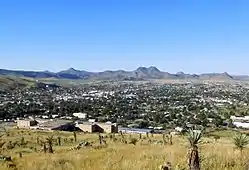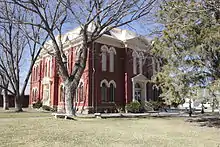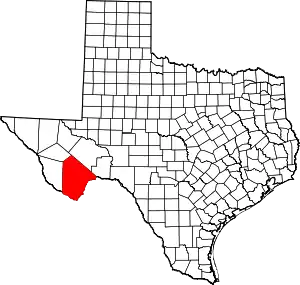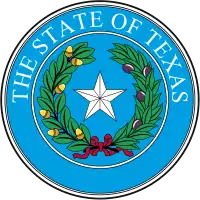Alpine, Texas
Alpine (/ˈælpaɪn/ AL-pyne) is a city in and the county seat of Brewster County, Texas, United States.[8] The population was 5,905 at the 2010 census.[9] The town has an elevation of 4,475 ft (1,364 m), and the surrounding mountain peaks are over a mile (1600 m) above sea level. The university, hospital, library, and retail make Alpine the center of the sprawling 12,000 square miles (31,000 km2) but wide open Big Bend area (combined population only 12,500) including Brewster, Presidio, and Jeff Davis counties.
Alpine, Texas | |
|---|---|
 Alpine from atop Hancock Hill to the southwest. | |
| Nickname(s): The Heart of Big Bend | |
 Location in the state of Texas | |
| Coordinates: 30°21′39″N 103°39′56″W[1] | |
| Country | United States |
| State | Texas |
| County | Brewster |
| Government | |
| • Mayor | Andres "Andy" Ramos [2] |
| Area | |
| • Total | 4.80 sq mi (12.44 km2) |
| • Land | 4.80 sq mi (12.43 km2) |
| • Water | 0.00 sq mi (0.00 km2) |
| Elevation | 4,475 ft (1,364 m) |
| Population | |
| • Total | 5,905 |
| • Estimate (2019)[5] | 5,982 |
| • Density | 1,245.99/sq mi (481.09/km2) |
| Time zone | UTC-6 (CST) |
| • Summer (DST) | UTC-5 (CDT) |
| ZIP codes | 79830-79832 |
| Area code(s) | 432 |
| FIPS code | 48-02104[6] |
| GNIS feature ID | 1377837[7] |
| Website | cityofalpine |
History

The area had been a campsite for cattlemen tending their herds between 1878 and the spring of 1882, when a town of tents was created by railroad workers and their families. Because the section of the railroad was called Osborne, that was the name of the small community for a brief time. The railroad needed access to water from springs owned by brothers named Daniel and Thomas Murphy, so it entered into an agreement with the Murphys to change the name of the section and settlement to Murphyville in exchange for a contract to use the spring. In November 1883, the Murphys registered a plat for the town of Murphyville with the county clerk of Presidio County.
The town's name was changed to Alpine on February 3, 1888, following a petition by its residents. At this time, a description of the town mentioned a dozen houses, three saloons, a hotel and rooming house, a livery stable, a butcher shop, and a drugstore, which also housed the post office.[11]
Alpine grew very slowly until Sul Ross State Normal College (now Sul Ross State University) was opened in 1920. The development of Big Bend National Park in the 1930s and '40s spurred further growth. The population was estimated at only 396 in 1904, but by 1927, it had risen to 3,000. The 1950 census reported Alpine's population at 5,256, and a high of roughly 6,200 was reached by 1976. In 1990, the population was down to 5,637. In 2000, the population grew modestly to 5,786 and 5,905 by 2010.[11]
The town was always small enough that no one insisted on tearing down old buildings to make parking lots, and it is still too small to interest most big-box store chains. The Holland Hotel, built during a brief mercury mining boom,[10] was designed by Henry Trost, a distinguished regional architect. Today, it helps to anchor a traditional downtown of early 20th-century buildings still occupied by family-owned retailers and restaurants.
Geography
The town sits on a high plateau, in the Chihuahua Desert, with the Davis Mountains to the north and the Chisos Mountains to the south. Outcrops of ancient volcanic rocks spread to the northwest. Other layers of rocks have been exposed over time as the mountains were forced up and then eroded. The high elevation cools the desert air in the evenings.
Alpine is located on U.S. Route 90 about 26 miles (42 km) east of Marfa and 31 miles west of Marathon.
According to the United States Census Bureau, the city has a total area of 4.7 square miles (12.1 km2), all land.[12]
Climate
In the winters, ample sunshine usually warms the days, though the nights can be chilly due to the 4,475 feet or 1,360 metres elevation. In the summer, the fierce sun causes hot days, pleasantly relieved in the evening by the same high elevation. According to the Köppen climate classification system, Alpine has a semiarid climate, BSk on climate maps.[13]
- Coordinates: 30.37639°N 103.66000°W
- Elevation: 4,450 feet (1,356 m)[14]
| Climate data for Alpine, Texas (Mar 1, 1900–Mar 31, 2013) | |||||||||||||
|---|---|---|---|---|---|---|---|---|---|---|---|---|---|
| Month | Jan | Feb | Mar | Apr | May | Jun | Jul | Aug | Sep | Oct | Nov | Dec | Year |
| Record high °F (°C) | 81 (27) |
89 (32) |
91 (33) |
99 (37) |
102 (39) |
107 (42) |
106 (41) |
103 (39) |
101 (38) |
97 (36) |
87 (31) |
83 (28) |
107 (42) |
| Average high °F (°C) | 60.5 (15.8) |
64.5 (18.1) |
70.9 (21.6) |
78.7 (25.9) |
85.4 (29.7) |
90.8 (32.7) |
89.4 (31.9) |
88.5 (31.4) |
83.8 (28.8) |
77.8 (25.4) |
67.8 (19.9) |
61.5 (16.4) |
76.6 (24.8) |
| Daily mean °F (°C) | 46.4 (8.0) |
49.8 (9.9) |
55.5 (13.1) |
63.2 (17.3) |
70.5 (21.4) |
76.8 (24.9) |
76.7 (24.8) |
75.8 (24.3) |
70.9 (21.6) |
63.6 (17.6) |
53.5 (11.9) |
47.7 (8.7) |
62.5 (16.9) |
| Average low °F (°C) | 32.7 (0.4) |
35.2 (1.8) |
40.1 (4.5) |
47.5 (8.6) |
55.5 (13.1) |
62.7 (17.1) |
64.0 (17.8) |
63.1 (17.3) |
58.0 (14.4) |
49.5 (9.7) |
39.3 (4.1) |
33.9 (1.1) |
48.5 (9.2) |
| Record low °F (°C) | 0 (−18) |
−2 (−19) |
10 (−12) |
20 (−7) |
29 (−2) |
32 (0) |
52 (11) |
49 (9) |
36 (2) |
21 (−6) |
−2 (−19) |
−3 (−19) |
−3 (−19) |
| Average precipitation inches (mm) | 0.53 (13) |
0.48 (12) |
0.36 (9.1) |
0.50 (13) |
1.24 (31) |
2.30 (58) |
2.75 (70) |
2.65 (67) |
2.57 (65) |
1.30 (33) |
0.51 (13) |
0.60 (15) |
15.80 (401) |
| Average snowfall inches (cm) | 1.3 (3.3) |
0.5 (1.3) |
0.3 (0.76) |
0 (0) |
0 (0) |
0 (0) |
0 (0) |
0 (0) |
0 (0) |
0.1 (0.25) |
0.4 (1.0) |
0.7 (1.8) |
3.1 (7.9) |
| Average precipitation days (≥ 0.001 in) | 3.41 | 2.92 | 2.44 | 2.52 | 5.20 | 7.48 | 8.46 | 8.38 | 7.86 | 4.74 | 2.99 | 3.14 | 60.29 |
| Source: Western Regional Climate Center, Desert Research Institute[15] | |||||||||||||
Demographics
| Historical population | |||
|---|---|---|---|
| Census | Pop. | %± | |
| 1920 | 931 | — | |
| 1930 | 3,495 | 275.4% | |
| 1940 | 3,866 | 10.6% | |
| 1950 | 5,261 | 36.1% | |
| 1960 | 4,740 | −9.9% | |
| 1970 | 5,971 | 26.0% | |
| 1980 | 5,465 | −8.5% | |
| 1990 | 5,622 | 2.9% | |
| 2000 | 5,786 | 2.9% | |
| 2010 | 5,905 | 2.1% | |
| 2019 (est.) | 5,982 | [5] | 1.3% |
| 1850-2000,[16] 2010[12] | |||
As of the 2000 census,[6] 5,786 people, 2,429 households, and 1,435 families resided in the city. The population density was 1,416.5 people per square mile (547.5/km2). The 2,852 housing units averaged 698.2 per square mile (269.9/km2). The racial makeup of the city was 79.19% White, 1.33% African American, 0.81% Native American, 0.45% Asian, 0.07% Pacific Islander, 15.45% from other races, and 2.70% from two or more races. Hispanics or Latinos of any race were 50.31% of the population.
Of the 2,429 households, 28.7% had children under the age of 18 living with them, 43.7% were married couples living together, 11.8% had a female householder with no husband present, and 40.9% were not families. About 34.3% of all households were made up of individuals, and 13.1% had someone living alone who was 65 years of age or older. The average household size was 2.34 and the average family size was 3.04.
In the city, the population was distributed as 24.3% under the age of 18, 14.1% from 18 to 24, 26.0% from 25 to 44, 20.8% from 45 to 64, and 14.9% who were 65 years of age or older. The median age was 34 years. For every 100 females, there were 93.7 males. For every 100 females age 18 and over, there were 90.4 males.
The median income for a household in the city was $23,979, and for a family was $31,658. Males had a median income of $27,720 versus $19,575 for females. The per capita income for the city was $13,587. About 15.5% of families and 20.9% of the population were below the poverty line, including 22.3% of those under age 18 and 17.1% of those age 65 or over.
Education
Colleges and universities
Sul Ross State University began as a teachers college in 1920, with its original campus in Alpine. Named for Lawrence Sullivan Ross, a Confederate States Army general during the American Civil War, Texas' 19th governor and later president of the new land grant college which became Texas A&M, it is now a member of the Texas State University System.
The 600-acre main campus on the lower slopes of Hancock Hill contains 20 or so buildings, most designed in Classical Revival style, and all harmoniously faced with red brick and white trim.[17] The hillside gives fine views of the town below and the surrounding mountain ranges. The Bar-SR-Bar brand of the college is whitewashed on stones high above. In 1981, students placed a desk on Hancock Hill and today visitors are invited to hike up to "sign the register".[17]
About 2,000 students attend here, many living in Lobo Village, which boasts 250 new apartment-style residence units. Both bachelor's and master's programs are available in fields such as behavioral and social sciences, business administration, computer science and mathematics, education, geology, law enforcement, and vocational nursing.[18]
Sul Ross ranked number four in affordability among public universities according to U.S. News & World Report.[17] It was included in "The Nation's 30 Most Attractive Yet Affordable Campuses", published by AffordableSchools.net, based on its combined qualities of affordability and the beauty of the campus and surrounding area.[19]
Intercollegiate sports include men's and women's basketball, cross country, track and field, and tennis, along with men's baseball and women's softball, men's football and women's soccer, and women's volleyball.[20] The teams are known as the Lobos, and play in the American Southwest Conference.[21]
Sul Ross was the founding home of the National Intercollegiate Rodeo Association in 1949. The Sul Ross Rodeo Club competes in 10 NIRA rodeos each year. The NIRA rodeo hosted in Alpine is a big event for the school and the community.[22]
K-12 schools
Alpine Independent School District serves more than 1,000 local students attending Alpine Elementary School, Alpine Middle School, and Alpine High School, in classes from Pre-K, Kindergarten, and first through 12th grades.[23]
On the Texas Education Agency report card for 2013–14, the high school, with 277 students in grades 9–12, reached "Met Standard" overall, while receiving Distinction designations in mathematics, social studies, top 25% closing performance gaps, and postsecondary readiness. Notably, average class sizes in Alpine High are only about two-thirds the state average.[24] The Middle School, with 309 students in grades 5–8, also reached "Met Standard", while receiving Distinction designations in mathematics and social Studies.[25]
School colors are purple and old gold. The high school is home to the Alpine Fightin' Bucks and Lady Bucks. Sports include football, volleyball, cross-country, girls' basketball, boys' basketball, powerlifting, track and field, baseball, softball, golf, athletic training, and tennis. Alpine hosts the Big Bend Mountain Ramble, a "mile-high cross country meet, the highest race in Texas", as well as high-school and junior-high relays.
Alpine Montessori School[26] is a private, nonsectarian, nonprofit school which serves grades pre-K through sixth.
Alpine Christian School is a nondenominational Christian school serving grades pre-K through 12.
Museum
The Museum of the Big Bend on the Sul Ross campus uses world-class exhibits of Native American artifacts, cultural history, geology, paleontology, and Western art to introduce the visitor to the Big Bend region. Subjects include the area's Indian tribes, the Buffalo soldiers, the mining era, the stagecoach, the railroad, and the history of Big Bend National Park. The overview includes historic photographs and short videos. The building was constructed in 1937 with local stone. Funding came from the Texas Centennial Commission and the Works Progress Administration, a federal make-work program during the Depression. Open Tuesday-Sunday, admission is free.[27]
Library
The Alpine Public Library opened a facility in February, 2012, offering computer use with free Wi-Fi and access to online data, as well as traditional books, magazines, and other periodicals, CDs and DVDs, and a used bookstore, Re-Reads. Located at 805 W. Avenue E, it has a community meeting room, and is open Mon-Sat.
Begun by volunteers in 1947, the Alpine Public Library remains an independent entity with its own board of directors, though it is well-supported by the taxpayers of Brewster County and the City of Alpine.[28] The community institution has a staff, with additional work done by volunteers. Special programs, like a science club and computer learning, are aimed at users from preschoolers and teens to parents and retirees.[29]
Hospital
Big Bend Regional Medical Center is a 25-bed facility. Inpatient and outpatient services are provided.[30]
Sports
Alpine is home to the Alpine Cowboys independent baseball team.[31] A member of the Pecos League, the Cowboys play their home games at Kokernot Field. Alpine is also home to the high school football team the Alpine Fightin Bucks. The Bucks are a class 3A Division I high school football team.
Sites on National Register of Historic Places
The Brewster County Courthouse and Jail was built in 1887–1888 by Tom Lovett, a local contractor, who apparently designed the buildings, as well (documentation is scarce). Open to visitors, historic photographs are displayed in the great hall.
The red brick courthouse is a fine example of the American Second Empire Style. The rectangular mass has five bays of paired round-arch window openings on the longer north and south facades. The shorter east and west facades have three bays. On three facades, the center bay contains a doorway at ground level, set in a thin, barely protruding pavilion. The second-story windows are slightly taller than the first-floor openings, a trick of the eye making the two-and-a-half-story building seem even taller. The walls are topped by a pressed-tin entablature composed of a frieze and cornice. The mansard roof is marked by steeply hipped pyramidal towers with pressed-tin cresting. The interior retains exemplary pressed-tin ceilings and some original woodwork. A wooden staircase with Eastlake-type details rises to the general courtroom on the second floor.
The adjoining Brewster County Jail is distinguished by a crenelated brick parapet wall, suggesting "a fortress-like impregnability".[10]
Attractions
Alpine makes a central base for exploring area attractions: the Big Bend National Park, Big Bend Ranch State Park, Fort Davis National Historic Site, Davis Mountains State Park with its Indian Lodge, the Chihuahuan Desert Nature Center and Botanical Gardens, and the McDonald Observatory, perched atop Mt Locke at 6,790 feet. Also worth visiting are Marathon with its iconic Gage Hotel; the historic hotel Limpia of Fort Davis; Marfa with the Chinati Foundation Museum of Minimalist Art; the ghost town of Terlingua and the golf resort of Lajitas; and the River Road, FM 170, a 120-mile scenic route through the majestic Rio Grande Valley between Presidio and the Big Bend parks.
Attractions in and close to Alpine
Museum of the Big Bend has fun and informative displays, a children's corner, and a quality gift shop, on the campus of Sul Ross State University, giving background information on sights in the Big Bend region.
Turner Range and Animal Science Center hosts several rodeos and horse shows during the year at the covered S.A.L.E. Arena. At other times, students can be seen practicing their skills in the outdoor arena. The facility is near the main campus of Sul Ross.
Historic Walking/Windshield Tour passes historic homes, churches, and other sites, and through the Main Street City downtown district with several murals, following a brochure available at the Chamber of Commerce.
Night life - the local community, students from the college, and passing tourists support a thriving music scene. Railroad Blues hosts bands of genres including Country, Western, Blues, and Rock and also features the popular weekly "Wednesday Night Karaoke with DJ Sir Brady and DJ Alpaca". Harry's Tinaja, an eclectic bar downtown, also features live music.
Restaurant scene - restaurants range from the Reata with reservations suggested,[32] the Saddle Bar on Holland Ave. and the Century Grill in the Holland Hotel,[33] to the Cow Dog,[34] an enormously popular food truck, and many more.
Woodward Ranch - is closed (sold in 2014 to private party who does not allow rock hunting); you *used* to be able to go prospecting on your own, the only place on earth with the red plumed agate, along with other agates, geodes, and semiprecious stones. The Chamber of Commerce has more information on other locations to seek examples of the various rocks in the area.[35]
Stillwell Store - Hallie's Hall of Fame Museum is located out in the empty ranch lands, where one can appreciate the hard but fulfilling life of a woman in the Old West.
Blue Creek Trail follows a scenic hiking path, mostly along dry stream channels, passing towering rocks of vivid earth tones. The first part is easy going, easy return, but the trail extends for many miles with greater challenges. Summer is hot, so take plenty of water, or hike in the fall, winter, or spring.
Alpine Country Club, next to Kokernot Field, has a popular nine-hole golf course.
Arlington Southwest Cemetery, located 4 miles east of Alpine, is a memorial funded by the Big Bend Veterans for Peace. Each gravestone serves as a memorial for each individual soldier from Texas killed during the invasion and occupation of Iraq of the early 21st century.
Annual events
Texas Cowboy Poetry Gathering, usually late February, is a celebration of the oral tradition of working cowboys in poetry, song, and music.[36]
Trappings of Texas, in April, is an exhibit and sale of custom gear and Western art held at the Museum of the Big Bend.
Big Bend Gem and Mineral Show, in April, is held at the Civic Center.
Cinco de Mayo[37] includes a parade, enchilada dinner, music and dancing, car show, and Grand Mercado at Kokernot Field.[38]
Alpine Cowboys[31] professional baseball games take place at historic Kokernot Field.
Theater of the Big Bend,[39] for over 50 years, this local theater troupe has performed various popular plays and musicals at the Kokernot Lodge outdoor amphitheater.
Fourth of July/Fiestas Barrios, July 4, parade, food, music, fireworks
Viva Big Bend music festival,[40] in July, more than 50 bands play at venues from Marathon to Marfa, Fort Davis to Alpine.
Drive Big Bend[41] has driving tours, music, parties, and a car show at Kokernot Field for antique, classic, and performance automobiles.
Big Bend Ranch Rodeo,[42] in August, displays the skills of working cowboys (rather than rodeo professionals).
National Intercollegiate Rodeo
No Country For Old Men,[43] in October, this bike race lists itself as "America's Premiere 1000 Mile Road Race".
ARTWALK,[44] The weekend before Thanksgiving, art spills from the galleries onto the streets and Arbolitos Park, with chalk art on the sidewalks, live music, and a parade of flags.
Parade of Lights, December
Public art
A mural in the former post office at 109 West E St was painted as part of the New Deal make-work programs during the Great Depression. Surviving murals from the project are found in 60 or so Texas cities and towns. Completed in 1940, this mural is by a Spanish-born and trained artist, Jose Moya del Pino, who was living and working in San Francisco. In the foreground, three figures recline on a rocky overlook (somewhat improbably, but this is art, not photography). They are each reading: a book, a magazine, and a tabloid newspaper, celebrating how the post office brings information and education to small towns and even cattle ranches. On the horizon, the Twin Sisters peaks mark the location, with the town in the middle distance, including, at the behest of townspeople, the characteristic red-brick buildings of the Sul Ross State campus.[45]
Popular culture
- J. Frank Dobie, the famed folklorist, author of Coronado's Children and more than 25 other books, taught at Alpine High School in 1910 and 1911 in his first job after graduating from Southwestern University in Georgetown, Texas.
- H. Allen Smith, the American humorist, author of Low Man on a Totem Pole, Rhubarb, and other bestsellers, as well as thousands of newspaper columns and magazine articles, retired to Alpine in 1967.
- Nelson Algren, novelist The Man with the Golden Arm, wrote his first story while working at a gas station in Alpine during the Depression (after graduating from the University of Illinois at Champaign-Urbana). He was caught stealing a typewriter from a classroom at Sul Ross to continue writing. The months he spent in jail deepened his identification with the losers and outsiders who were the characters of his later fiction.
- Trackdown, the CBS Western television series had "Alpine, Texas" as the title of its seventh episode, starring Robert Culp as Texas Ranger Hoby Gilman. The episode first aired on November 15, 1957. In the story line, Gilman must change the false perception that has developed among the townspeople toward the Texas Rangers.[46] The Trackdown narrator begins: "Alpine was like a hundred other towns in Texas. The only thing it had that most others didn't was ... the main line of the Southern Pacific. ... There is nothing unusual about this day in Alpine except that Hoby Gilman, a Texas Ranger, rode in." At the end of the episode, when Gilman succeeds in reversing the attitude of the community, the narrator concludes: Alpine is a prosperous town again, but now there's a fine air of security about it. It's a nice town to live in, because they discovered as Hoby said they would, that when it got off its knees, it cast a much bigger shadow than it thought it did. The people of Alpine feel a lot different about a lot of things now, especially Texas Rangers.[47]
- Fandango, with Kevin Costner includes a scene set at the Sonic Drive-In in Alpine.
- It is the Texan setting of the film Gambit (M. Hoffman, 2012).
- Boyhood, the 2014 movie starring Ellar Coltrane, Patricia Arquette, Lorelei Linklater, and Ethan Hawke, featured places in and around Alpine. It received six Academy Award nominations. Nominated for five Golden Globe awards, it won Best Motion Picture-Drama, Best Director for Richard Linklater, and Best Supporting Actress for Patricia Arquette.[48]
Post offices
- Alpine Post Office 103 N. 13th Street, Alpine, Texas 79830-9998
- Cpu Sul Ross Post Office 400 N Harrison Street, Alpine, Texas 79832-9991
Transportation
- Alpine-Casparis Municipal Airport serves general aviation.
- Amtrak's Sunset Limited long-distance train stops three times a week at the Alpine station on the former Southern Pacific Railroad's Sunset Line, the nation's second transcontinental route, now part of Union Pacific. Alpine is a crew change location for Union Pacific freight trains, making for constant activity along the tracks. In the past Alpine was also served by the Kansas City, Mexico and Orient Railway.
- All Aboard America! operates intercity bus service from the KCS Quick Stop.[49]
 US Highway 90.
US Highway 90.
In recent years, Alpine has served as an unofficial stop for bicyclists riding across the United States due to its location on the Adventure Cycling Association's Southern Tier Bicycle Route.[50]
Notable people
- Carl W. Bauer - former Louisiana State Senator
- Pete Gallego - former Texas State Senator and U.S. Representative
- Gary Painter - Midland County sheriff
- Amanda Marcotte - feminist blogger for Slate and the Guardian
- Bake Turner - former NFL wide receiver
- Joaquin Jackson - former Texas Ranger and actor
References
- "US Gazetteer files: 2010, 2000, and 1990". United States Census Bureau. 2011-02-12. Retrieved 2011-04-23.
- http://www.cityofalpine.com/government/city_council_members/members.php. Retrieved 10 September 2019. Missing or empty
|title=(help) - "2019 U.S. Gazetteer Files". United States Census Bureau. Retrieved August 7, 2020.
- "State and County Quick Facts". United States Census Bureau. Archived from the original on January 27, 2014. Retrieved March 3, 2015.
- "Population and Housing Unit Estimates". United States Census Bureau. May 24, 2020. Retrieved May 27, 2020.
- "U.S. Census website". United States Census Bureau. Retrieved 2008-01-31.
- "US Board on Geographic Names". United States Geological Survey. 2007-10-25. Retrieved 2008-01-31.
- "Find a County". National Association of Counties. Archived from the original on 2011-05-31. Retrieved 2011-06-07.
- "ALPINE - Texas Almanac". www.texasalmanac.com. 11 November 2010.
- "Archived copy". Archived from the original on 2013-02-25. Retrieved 2007-03-05.CS1 maint: archived copy as title (link)
- B., CASEY, CLIFFORD (9 June 2010). "ALPINE, TX [BREWSTER COUNTY]". www.tshaonline.org.
- "Geographic Identifiers: 2010 Demographic Profile Data (G001): Alpine city, Texas". U.S. Census Bureau, American Factfinder. Archived from the original on February 12, 2020. Retrieved April 22, 2014.
- "Alpine, Texas Köppen Climate Classification (Weatherbase)". Weatherbase.
- "US COOP Station Map". Western Regional Climate Center, Desert Research Institute. Retrieved May 5, 2015.
- "ALPINE, TEXAS (410174), Period of Record Monthly Climate Summary". Western Regional Climate Center, Desert Research Institute. Retrieved May 5, 2015.
- Texasalmanac (PDF; 1,2 MB). Retrieved 2013_08-01
- "Sul Ross State University - The University of the Big Bend". www.sulross.edu.
- "Academics - Sul Ross State University". www.sulross.edu.
- "SUL ROSS RECEIVES NATIONAL RANK - Sul Ross State University". www.sulross.edu.
- "Sul Ross State University Athletics". www.srlobos.com.
- "American Southwest Conference - ASC Member Institutions". www.ascsports.org.
- "General Information About Rodeo - Sul Ross State University". www.sulross.edu.
- http://www.alpine.esc18.net
- "Alpine ISD - Missing Page". www.alpine.esc18.net.
- ISD, Alpine. "Alpine ISD - Alpine Middle School". www.alpine.esc18.net.
- "Alpine Montessori School". www.alpinemontessori.org.
- "Museum of the Big Bend". Museum of the Big Bend.
- "History : Alpine Public Library". alpinepubliclibrary.org.
- "Alpine Public Library". alpinepubliclibrary.org.
- "About Us - Big Bend Regional Medical Center". www.bigbendhealthcare.com.
- "Welcome to Alpine Cowboys Professional Baseball Team!". alpine.pecosleague.com.
- "Reata Alpine – Reata Restaurant".
- "Century Bar & Grill: A fine dining restaurant at Alpine, Texas' historic Holland Hotel". www.thecenturybarandgrill.com.
- "Cow Dog - 100% Beef Grilled Hot Dogs in Alpine, Texas". www.cowdogdog.com.
- "Rock Hunting in the Big Bend of Texas". terismithrockhunts.com.
- "Texas Cowboy Poetry Gathering". texascowboypoetry.com.
- "Archived copy". Archived from the original on 2015-01-19. Retrieved 2015-01-19.CS1 maint: archived copy as title (link)
- "Events - Alpine, Texas". visitalpinetx.com.
- "The Theatre of The Big Bend - Sul Ross State University". www.sulross.edu.
- "VIVA BIG BEND : Alpine - Fort Davis - Marfa - Marathon". www.vivabigbend.com.
- "Drive Big Bend - Formstack". drivebigbend.com.
- http://www.bigbendranchrodeo.com
- "Ultra race in Texas". Ultra race in Texas.
- "Artwalk – Alpine, Texas". artwalkalpine.com.
- Parisi, Philip (2004), The Texas Post Office Murals, Art for the People, College Station, Texas: Texas A&M University Press
- "Trackdown". Classic TV Archives. Retrieved April 14, 2012.
- Billy Hathorn, "Roy Bean, Temple Houston, Bill Longley, Ranald Mackenzie, Buffalo Bill, Jr., and the Texas Rangers: Depictions of West Texans in Series Television, 1955 to 1967", West Texas Historical Review, Vol. 89 (2013), p. 105
- "Boyhood" – via www.imdb.com.
- "Midland-Presidio, TX Bus Routes - All Aboard America". www.allaboardamerica.com.
- "We will be right back!". 14 June 2013. Archived from the original on 5 December 2011. Retrieved 29 November 2011.
External links
| Wikimedia Commons has media related to Alpine, Texas. |
| Wikivoyage has a travel guide for Alpine (Texas). |
- City of Alpine
- Alpine Official Visitors Info
- Alpine Chamber of Commerce
- Sul Ross State University
- Alpine Area Parks
- Alpine Avalanche, local newspaper since 1892
- West Texas Weekly, local weekly newspaper

